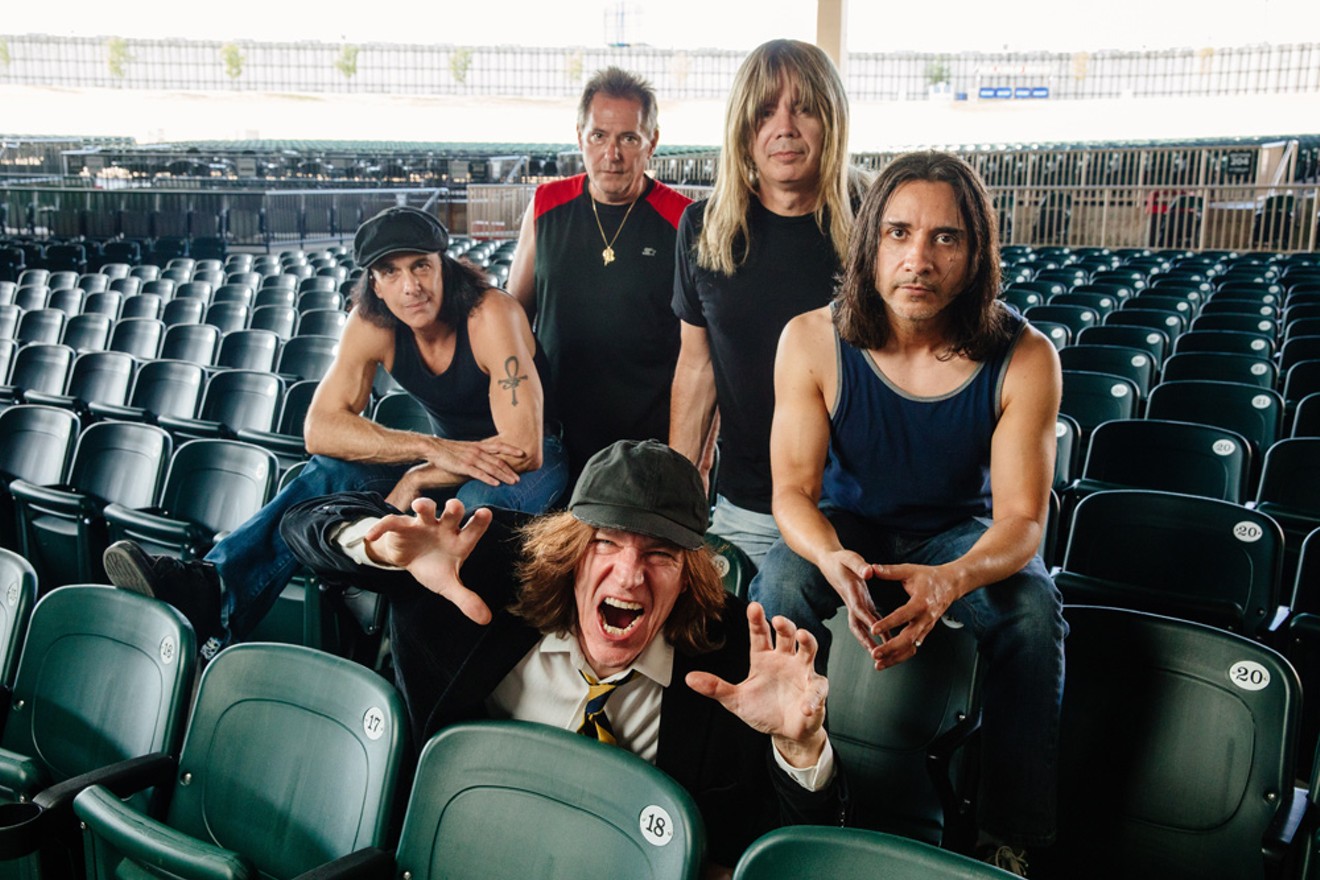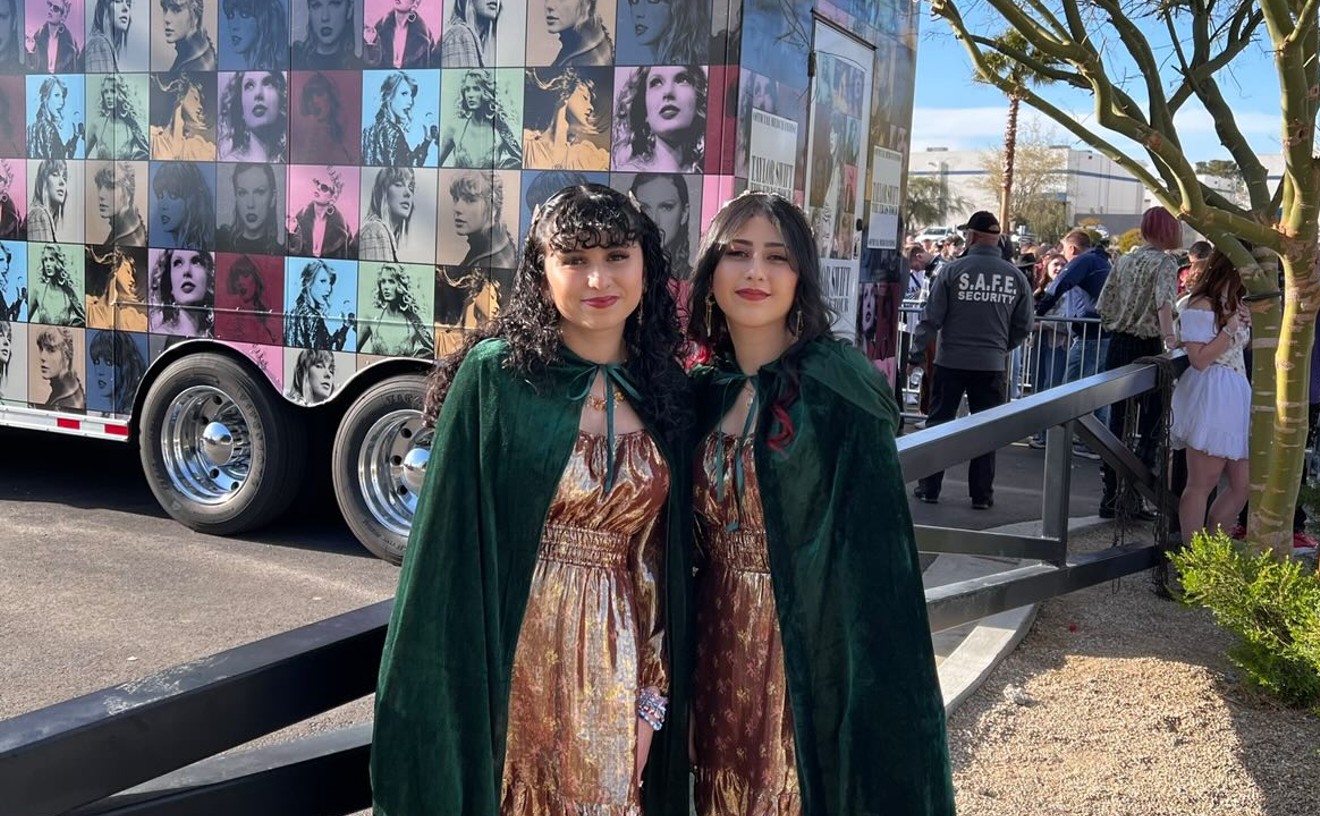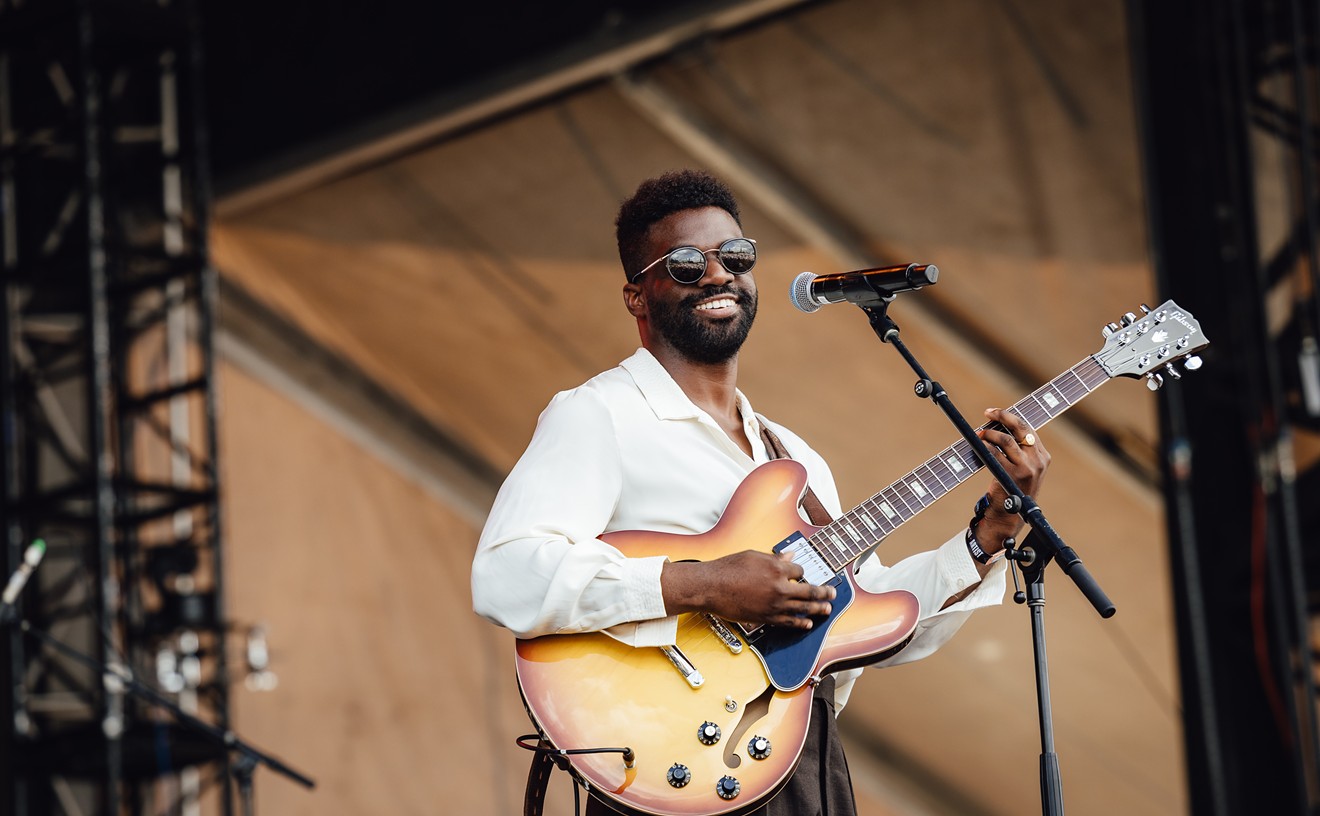“Even after you get established as an original artist, I still don’t think it’ll pay as well as the tribute thing, which is really unfortunate,” he says.
Mroz moved to Los Angeles from Chicago in the ’80s and started a band, Doc Tonic. They experienced some success and played all the “big rooms.” But Mroz felt they were constantly under scrutiny by other musicians and it was sapping the fun from performing.
“They're all watching your band with their arms crossed, picking it apart and saying why you suck,” he says.
But there was one moment in every show he always looked forward to. Mroz grew up listening to AC/DC, Aerosmith and Cheap Trick, and during the six years Doc Tonic was a band, it would close out shows with an AC/DC cover. The atmosphere at the show would completely change; people would loosen up and engage.
Chicago had a big tribute band scene, but Mroz hadn’t found one in LA. He started a Cheap Trick tribute there on a whim. “All of a sudden, all of these people started watching the band with smiles on their faces,” he says.
Six months later, Mroz’s day job in the video game industry required him to relocate to Dallas. He says the pay in Texas is “way better” than on the West Coast, even for original artists. But as in LA, there was another opportunity. When Mroz first moved to Dallas, the only tribute band in town was a Beatles act.
Darren Caperna, singer for Doc Tonic, did a mean Brian Johnson from AC/DC, but he was living in New York at the time. Mroz invited him to Dallas.
“I’d call him up, and I'd say, ‘Hey, you wanna come out here, and we'll just do a few shows here, and we'll just have some fun. We'll be able to play and have something to look forward to.’ He said, ‘Yeah, let's try it.’ So I formed Back in Black, and this stupid thing exploded on us,” Mroz says.
Eighteen years later, Back in Black is one of dozens of tribute and cover bands scattered around Dallas-Fort Worth. There are bands that do classic rock, like Rock and Roll Over (Kiss) and Crüed and Tattooed (Mötley Crüe); bands that do grunge, like Pearl Gem (Pearl Jam) and Nervana (Nirvana); and bands that perform newer music, like the Strokes cover band Different Strokes.
What it comes down to is people's love of familiarity and aversion to risk.
“People see a tribute band, they see our ad, and we look like AC/DC. They know what they’re gonna get when they walk in that room,” Mroz says. “That sells tickets to the venue. That sells alcohol. If you’re an original band, people are taking a crapshoot.”
Back in Black is the most successful band of its kind in the region and one of the top tributes in the country. In March 2016, after Johnson was forced to leave AC/DC’s tour, Caperna was asked to audition for the role.
“We just never thought, in a million years, we would run into AC/DC," Mroz says. "We didn't think they knew about us. They're in Australia, they're so big — why would they care about a stupid tribute band, right?”
AC/DC flew the whole band to Atlanta for the audition.
“They treated us like their peers. They truly wanted to know about us. It wasn't like a meet and greet. They were asking us questions. And it turns out they had known about us for a long time,” Mroz says. “They said that they think we're one of the best tribute bands that, for AC/DC, are out there. And the coolest thing they said to us is that ‘we consider you guys now part of our family.’”
Back in Black still sells out House of Blues. Mroz routinely gets asked for his autograph. Playing AC/DC consistently generates bigger checks than Mroz and Caperna ever saw in their Doc Tonic days.
“It’s a great demographic for clubs," Mroz says. "That demographic likes to drink. When we play clubs, the bar owners are thrilled because these guys have pockets.”
Praise or profit
All bands need the support of the artists they tribute, even if few receive it as directly as Back in Black. Local entertainment lawyer C. Luke Gunnstaks, formerly a touring musician, says any band that works to sound and look like another band, and markets itself as such, is infringing on a right of publicity.“They’re supposed to seek and receive a license from the estate to perform,” Gunnstaks says.
None of the bands the Dallas Observer spoke to has such a license. Band members say the venues they play buy licenses from performing rights organizations BMI and ASCAP that allow them to host concerts featuring music published and owned by others.
“That doesn’t give the band license to pretend to be another band or to market themselves as a tribute band,” Gunnstaks says, pointing to a high-profile lawsuit in the ’80s in which the Beatles’ estate sued a touring musical called Beatlemania for lacking a license.
The tour got away with it for a while because various Beatles' estates were duking it out for supremacy, so no one could claim ownership of the band’s entity and likeness. But eventually, the tour shut down after failing to strike a financial arrangement that satisfied the Beatles.
Gunnstaks says there's a difference between Beatlemania, a “high-dollar production with big-name producers,” and tributes such as Dallas’ Hard Night’s Day, which, its manager says, doesn't have a license. These smaller, local acts may receive good pay relative to what most musicians make, but they aren’t raking in enough to make them worth suing, Gunnstaks says.
"It’s particularly amusing when someone gets a star complex pretending to be somebody else.” – C. Luke Gunnstaks, musician and lawyer
tweet this
It’s also generally safer to perform music by people who are no longer living.
“Dead folks are less likely to come after them cause they’re not in competition with them anymore,” Gunnstaks says. “The argument could be made that every Elvis impostor is actually helping Elvis’ estate by continuing to generate sales of original Elvis.”
Acts like Kiss — which still performs in full regalia and will in Dallas tomorrow — often conclude that a good tribute band is beneficial to their image and will also help them sell records. The Observer asked Mötley Crüe’s manager, Konstanze Louden, how the band feels about their tribute acts. “[Mötley Crüe] don't do kickbacks,” Louden said via email.
“When you’re looking at bands that are touring on a club circuit, the profits are fairly minimal when you factor in lodging,” Gunnstaks says. “There’s no intent to cheat or defraud. They’ll say, ‘We’re not pretending to be AC/DC or the Doors. We do this to honor them. This is our tribute. We’re fans; we’re not businessmen.’”
He’s aware of famous tribute bands like Back in Black, but he feels that even those arrangements are precarious.
“There was a great Eagles documentary, and they quote one of the Eagles saying, ‘Every band is on the verge of breaking up.’ They’re always dependent on a guy; if it’s a Doors tribute band, it’s the guy who pretends to be Jim Morrison, or if it’s AC/DC, it’s the guy who can play Bon Scott," Gunnstaks says. "The frontman might say, ‘I want a double share or I want a triple share,’ and the band might say, ‘Go do it by yourself and see how much money you make.’ It’s particularly amusing when someone gets a star complex pretending to be somebody else.”
Cover to cover
Barak Seguin has climbed the scaffolding surrounding the Granada Theater stage and is dangling 20 feet in the air as he sings, with nothing but his strength and coordination to keep him from falling. Women crowd around the stage, dancing provocatively and singing along. Most are in their 30s and 40s. Like Seguin, they were in their partying prime during the era of grunge rock. And tonight, he’s Eddie Vedder.Seguin is that guy Gunnstaks is talking about. On any given night, Seguin steps into the shoes of Jim Morrison, Bono, Kurt Cobain, Vedder and Robert Plant. In the past, he’s also been the frontman of acts honoring Red Hot Chili Peppers, Def Leppard, Led Zeppelin, Sammy Hagar and Guns N' Roses — 10 bands, all told, in the last 10 years. He recently auditioned for an 11th: the role of Maynard James Keenan in a Houston-based Tool tribute.
There are only a few acts Seguin won’t do. “I’ve tried to make sure that I don’t sing any Journey or really any Bon Jovi,” he says. “I think I've done pretty good.”
Seguin grew up in San Antonio and describes music as an addiction he’s had since he was 12. He was attracted early on to showmen.
“My inspiration probably stemmed early on from a little Michael Jackson when I was a kid, and I just wanted to breakdance and everything,” he says. But the grunge era, which was at its peak when Seguin was a teenager, had the biggest impact on his musical taste.
Cobain inspired him to pick up the guitar, and Vedder inspired him to start singing. He realized he had a voice when he started receiving compliments. Seguin began playing in original bands. He fell into the cover and tribute scene in his early 30s when he joined classic rock cover band Song Bully.
Most people differentiate cover and tribute bands this way: Cover bands play songs by a variety of artists in their sets and don’t necessarily dress the part, but tribute bands stick to one artist and mimic that artist’s behavior and attire. As a musical chameleon, Seguin had power to help pick Song Bully's set list, and soon other groups asked him to fill in.
In 2011, he toured with tribute band Guns 4 Roses and found himself plunked into a lifestyle unlike anything he’d experienced. He had to leave the band to save his relationship with the woman who's now his wife.
“It was not conducive to being in a relationship,” he says. “I had to leave the band, basically, because of too much unwanted attention [from women]. It got me into trouble a little bit.”
After leaving Guns 4 Roses, Seguin tried out for the part of Bono in a U2 tribute from Austin and Vedder in Dallas-based Pearl Gem. (He found the latter gig through a Craigslist ad.) Seguin got both gigs, and his list of frontman duties continued to grow from there. The Tool audition showcased his sometimes shocking ability at mimicry.
“They're like, ‘Man, you sound just like Maynard. How do you do that?’” Seguin recounts. “I'm like, ‘I don't know, but I've been doing it since I was 14.’”
When he started out with Pearl Gem, Seguin found it wasn’t that hard to get gigs. By the third show, the band was playing House of Blues.
“To be honest with you, there was not much business development at the beginning,” he says. It’s something Seguin knows a bit about; he moved to Dallas to pursue a business management degree and keeps a day job as an executive recruiter.
Pearl Gem flew on private plane to a music festival in Alabama, where it performed for a crowd of 10,000. It also has a spinoff Nirvana act that can play on the same bills. Many of Dallas’ tribute acts share members.“We don’t do kickbacks.” – Mötley Crüe manager Konstanze Louden, on tribute bands
tweet this
Seguin still has a rock band called USW, or Ultrasoundwave, which plays original music. He says playing in a successful tribute act is still no match for the high you get from playing your own songs.
“When you can impress a roomful of people, whether it's five people or it's 100 people, it's a lot more fulfilling when you write something and it gets every bit as much adoration as anything you've covered.”
Although the gigs came easily, getting Pearl Gem off the ground was an arduous process. Similar to the real Pearl Jam, the band went through a lot of drummers before it found the right fit with Matthew Crain.
“We tried, I want to say, 15 drummers,” Seguin says. “It was probably the closest thing to what it’s like to be in Pearl Jam.”
He wanted to get the dynamic right because he’s passionate about Pearl Jam’s music. He foresees Pearl Gem having the most longevity of all the tributes he plays in because he can age with Eddie Vedder. Eventually, he will be too old to play Kurt Cobain or Jim Morrison, artists who died young.
While music isn’t his sole income, tribute acts are a way for Seguin to make a profit doing what he loves. He says music is "like the other relationship in my relationship, and my wife's like, ‘OK, you've got to do this, right? If you’re going to do this, at least make money at it.’"
Comfort zone
This summer, the Granada Theater tried booking some new tribute bands. The public responded with ticket sales.“Not everybody is so adventurous in wanting to see a band they’ve never seen and just discover new music,” says the Granada's owner, Mike Schoder. “People are much more comfortable hearing music they know."
Many in the tribute band scene, including Seguin, say they thrive in Dallas because there’s a lack of good original music. Local metal guitarist Jim Crye plays with the tribute band Primal Concrete Cowboys and formerly played with Volume Dealer. He compared a recent show's 685 attendees with the few dozen he sees at most concerts for local bands writing their own tunes.
“My personal opinion is that live rock ’n’ roll is going the way of jazz and blues,” Crye told the Observer in July. “You can see it in the decline in attendance.”
But where Crye offers a bleak prognosis for the original music scene, Mroz and his bandmates in Back in Black have found opportunity.
Once they secured a fan base by biting AC/DC’s style, they started using that platform to market new businesses and even an original band. In 2003, Mroz opened a music school in Southlake called For Those About to Rock School, which employs the other members of Back in Black to teach hard rock.
“After I started the band, all the kids in the neighborhood were coming over saying, ‘Hey, teach me how to play an AC/DC song,’” he says.
Playing in a tribute band has also proved the best way for Mroz to satisfy his own artistic aspirations, an unexpected outcome. “After we launched Back In Black, Darren and I have always wrote a ton of songs," he says.
Their band, Stripwired, has an AC/DC sound that appeals to the thousands of people the band already performs for. Stripwired released a CD in 2008 that did well and will release another this fall.
“I could have my band open up for a sold-out House of Blues show. It just works so well,” Mroz says. “That's the people I wanna sell my music to, are the AC/DC fans. So it's a unique way to launch a record and market a record these days.”
Mroz credits his work in tributes for his career as a full-time musician. “That’s one great thing about Back in Black,” he says. “It took me out of the video game business.”

















